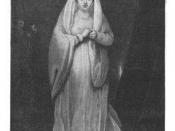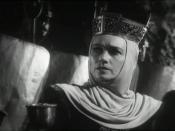The definition of a classical tragic hero is defined by Aristotle in The Poetics as "A man slightly better than most who falls from a high to a low position due to a hamartia. His fall is cathartic, evoking in the audience the feelings of fear and pity." Macbeth violates all three of these standards. Macbeth is not the only man slightly better than others, he rises in position instead of falling, his fall is not entirely his own fault, and does not evoke that much pity from the audience.
Macbeth starts out at the beginning of the play as a general in King Duncan's army and a distant relation of the king. He distinguishes himself as a fierce warrior but not as a great man or military strategist. The messenger tells the king "Doubtful it stood," with the army and the battle. (Act I, Scene 2, p.5) So this already proves that Macbeth is not that great because initially he did not have the situation under control.
Also there are other men who are just as great if not greater than Macbeth in the play. Duncan is a king which puts him above Macbeth and Banquo seems smarter than Macbeth because he does not believe everything that the witches say. (Act I, Scene 3, p.15) Also Macbeth lacks any real morals throughout most of the play. He orders the murder of women and children without much thought. ( Act IV, Scene 2, p.133) These types of behavior are something you do not expect from "a man slightly better than most."
Macbeth also does not follow the pattern of the fall. After he murders Duncan, Macbeth is not punished but promoted to the rank of the person he killed. (Act II, Scene 4, p.75) By the end of the play he dies, but that's not really a fall. Macbeth's death is more of a relief for him than it is a punishment. So Macbeth eventually does fall but not before he rises to a position above other men. Macbeth therefore breaks the classical tragic hero by starting low and rising before he falls.
Then there is the problem of Macbeth's hammartia. Macbeth's hammartia seems to be his ambition to acquire and keep power, but this is not totally clear until well into the play. At the beginning his ambition is sparked by the witches and fed by his wife, Lady Macbeth, so his hammartia is not entirely his fault. (Act I, Scenes 3 &7) He seems to genuinely be adverse to killing Duncan but his wife pushes him into it, this eventually brings about his downfall making it not entirely his own fault. This makes him seem sort of helplessly pushed toward his fate by outside forces which is something that is not part of the tradition of tragic heroes. At the end when he becomes desensitized to killing and is intent on keeping his power, he speeds up his own downfall, but Macbeth does not initiate the chain of events that lead up to his downfall by himself. This violates the standard of the hero falling through a fault of his own unassisted by fate or outside forces.
Macbeth is also helped along towards his downfall by the witches. They show Macbeth deceptive imagery and tell him half truths that encourage him to further his ambitions. (Act I, Scene 3; Act IV, Scene I) Along with Lady Macbeth, the witches help fan the flames of Macbeth's hammartia. This is another outside force exerting influence on the "tragic hero's" fate. This also breaks the standard of the hero falling because of his own flaw and not due to outside forces.
The final way that Macbeth breaks the tragic tradition is that he does not evoke much, if any, pity from the audience. At the beginning of the play you might feel some pity for Macbeth as he is goaded into murder by Lady Macbeth. However this pity soon disappears as you see him effortlessly and ruthlessly order the deaths of Banquo, Fleance, Lady MacDuff, and MacDuff's son. (Act III, Scene 2; Act IV Scene 3) This callus behavior towards innocents like the child of MacDuff makes you dislike Macbeth and hope for his downfall. Even more pity evaporates whenever Lady Macbeth dies and Macbeth gives her no more than a few thoughts before moving on to the military matters at hand. (Act V, Scene 5, p.183) The lack of grief experienced by Macbeth makes you realize how cold and ruthless he has become. At the end when he says he does not wish to kill MacDuff, a little pity resurfaces but it is crushed under all his previous bad actions and by his deciding to actually fight MacDuff instead of just letting MacDuff end his misery. (Act V, Scene 8, p.193)
One must conclude from all of these circumstances that Macbeth is not a classical tragic hero. He manages to violate all three of the standards of a classical hero. The two standards that are more violated pertain to his hammartia not being his own and to the fact that he does not evoke much pity. The third, which is that he is not better than most men, is violated but not as badly as the other too. Thus Macbeth is definitely not a classical hero as defined by Aristotle in The Poetics.





